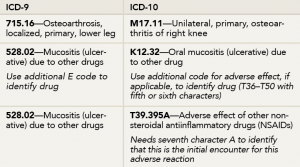This was an established patient visit with a new diagnosis. Because the PA sought out the physician to address the new problem and document the assessment and treatment, the visit can still be billed as incident-to. Note: The physician initiated the plan of care for treatment of the patient’s osteoarthritis, but her queasiness is a new problem noted as previously evaluated by the physician. If the PA had not included the physician input, the service could not have been billed as incident-to, but instead would have to be billed under his/her own PIN. If audited, the service would be denied as, “Payment adjusted as not furnished directly to the patient and/or not documented.”
History: Detailed history
- History of present illness contained six elements: location, duration, timing, severity, context and modifying factors.
- Review of symptoms contained two elements: musculoskeletal and gastric.
- Past family, social history—the past medical history was taken.
Examination: Detailed examination
- Five systems were examined: constitutional, cardiovascular, gastric, musculoskeletal and respiratory.
Medical decision making: Moderate
- One stable problem improving and one new problem without workup—extended.
- No data review or ordered—minimal.
- Prescription drug management—moderate.
For questions or additional information on coding and billing, contact Melesia Tillman, CPC, CPC-I, CRHC, CHA, at [email protected] or 404-633-3777 x820.


